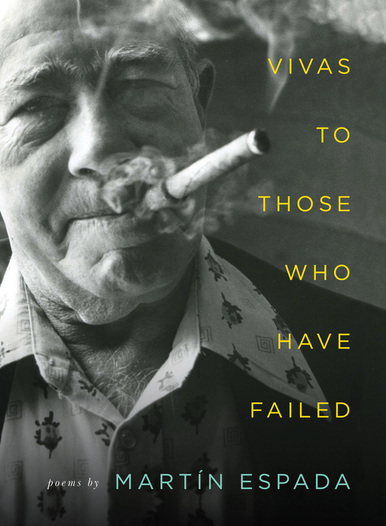Vivas to Those Who Have Failed

In this new collection of poems, Martín Espada gives voice to the spirit of endurance in the face of loss, articulating the transcendent vision of another, possible world. He invokes the words of Whitman in “Vivas to Those Who Have Failed,” a cycle of sonnets about the Paterson Silk Strike and the immigrant laborers who envisioned an eight-hour day. The heart of the new collection is a series of ten poems about the death of the poet’s father, one of Whitman’s “numberless unknown heroes.” “El Moriviví” uses the metaphor of a plant that grows in Puerto Rico and the meaning of its name—“I died/I lived”—to celebrate the many lives of Frank Espada, community organizer, civil rights activist and documentary photographer, from a jailhouse in Mississippi to the streets of Brooklyn. In mourning, the son lyrically imagines his father’s return to a bay in Puerto Rico: “May the water glow blue as a hyacinth in your hands.” Other poems confront collective grief: In the wake of the killings at the Sandy Hook Elementary School, “Heal the Cracks in the Bell of the World” urges us to “melt the bullets into bells.” Yet the poet also revels in the absurd, recalling his dubious “career” as a Shakespearean actor in a brawling company, finding madness and tenderness in the crowd at Fenway Park. Espada defiantly subverts the definition of “those who have failed.”
“Espada at his brilliant best, the poet laureate of our New America, with a voice that breaks heart, gives courage and burns all illusions.” –Junot Díaz
“From the exuberant and powerful author of The Republic of Poetry and ‘Alabanza’--the finest elegy we have to the fallen of the Twin Towers--comes this new collection of memorable, vital, heart-stopping poems. Eloquent in his celebration of those whose names and faces are "rubbed off / by oblivion's thumb like a Roman coin," laureate of ballparks and boxing rings, mad love and workers' strikes, moving elegist of his feisty Puerto Rican father, Martín Espada is an essentially American poet and true son of Walt Whitman. Walt would cheer this book.”–Alicia Ostriker
“In the battle against forgetfulness, in the ongoing war against dumb distraction and voluntary blindness, Martín Espada is our subcomandante. With an ear sweetened by long listening to voices most often unheard, he writes poems that resonate like bells forged of bronze and blood.”–Tim Seibles
“Martín Espada is one of the few poets in our time who really matters, because his words matter, and the people and the world he writes about matter. One thinks of Neruda, of Whitman, of Philip Levine as one finds oneself caught up by the magic of Espada’s voice.” –Paul Mariani
“In his tenderly elegiac, yet fierce collection…Espada’s poems continue to define the role of the poet as an emotional historian. Like Whitman, Espada stirs in us an undeniable social consciousness and connectedness.”–Richard Blanco
Review on NBC Latino
Review in The Washington Post
Review in The Progressive
Review on Best American Poetry Blog
Review on Literary Hub
“Espada at his brilliant best, the poet laureate of our New America, with a voice that breaks heart, gives courage and burns all illusions.” –Junot Díaz
“From the exuberant and powerful author of The Republic of Poetry and ‘Alabanza’--the finest elegy we have to the fallen of the Twin Towers--comes this new collection of memorable, vital, heart-stopping poems. Eloquent in his celebration of those whose names and faces are "rubbed off / by oblivion's thumb like a Roman coin," laureate of ballparks and boxing rings, mad love and workers' strikes, moving elegist of his feisty Puerto Rican father, Martín Espada is an essentially American poet and true son of Walt Whitman. Walt would cheer this book.”–Alicia Ostriker
“In the battle against forgetfulness, in the ongoing war against dumb distraction and voluntary blindness, Martín Espada is our subcomandante. With an ear sweetened by long listening to voices most often unheard, he writes poems that resonate like bells forged of bronze and blood.”–Tim Seibles
“Martín Espada is one of the few poets in our time who really matters, because his words matter, and the people and the world he writes about matter. One thinks of Neruda, of Whitman, of Philip Levine as one finds oneself caught up by the magic of Espada’s voice.” –Paul Mariani
“In his tenderly elegiac, yet fierce collection…Espada’s poems continue to define the role of the poet as an emotional historian. Like Whitman, Espada stirs in us an undeniable social consciousness and connectedness.”–Richard Blanco
Review on NBC Latino
Review in The Washington Post
Review in The Progressive
Review on Best American Poetry Blog
Review on Literary Hub